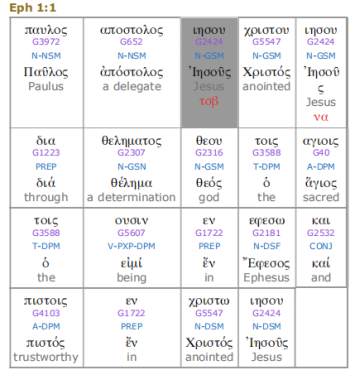J
Johann
Guest
Thanks for your reply and digging into the Greek, like I've said, it's all in the Definite Articles and in this verse only one, to the [Definite Article] saints kai pistois/faithful.So it’s okay though. We don’t arrive at our understanding by one verse but by many.
Pretty amazing...and you still get confused re the kai.....
So let‘s take a look at Ephesians 1:1. The NRSV reads, “To the saints who are in Ephesus and (καί) are faithful in Christ Jesus.” What is the relationship between “ the saints who are in Ephesus” and those who “are faithful in Christ Jesus”? One or two groups? Is the former the larger and the latter a subset? Can you be a “saint” and not be “faithful”?
The Greek is, at first glance, a little more ambiguous than the NRSV. τοῖς ἁγίοις τοῖς οὖσιν [ἐν Ἐφέσῳ] καὶ πιστοῖς ἐν Χριστῷ Ἰησοῦ. Word for word: “to the Saints who are in Ephesus and faithful in Christ Jesus.” Grammatically, the question is the precise meaning of καί.
The translations all see correctly (in my opinion) that this cannot be two groups of people. Paul can’t be addressing the “saints,” and then a second group who are “faithful.” If you let a gloss of καί control your understanding of its meaning, you could make this mistake. But none of the translations do.
The ESV comes dangerously close to conveying the wrong idea. “To the saints who are in Ephesus, and are faithful in Christ Jesus.” In fact, I think they step over the line and miscommunicate. (I lost this vote in committee.)
NASB. “To the saints who are at Ephesus and who are faithful in Christ Jesus.” The repetition of the “who” connects both phrases to the same “saints.” The NLT makes some effort to avoid the confusion with the use of the comma: “I am writing to God’s holy people in Ephesus, who are faithful followers of Christ Jesus.”
The NIV beautifully sees the καί as epexegetical and writes, “To God’s holy people in Ephesus, the faithful in Christ Jesus.”
The HCSB removes all doubt. “To the faithful saints in Christ Jesus at Ephesus.”
The point is that καί has a range of meaning, and you can’t always just stick in “and” and move on.
This also illustrated the myth of translations not being interpretive. If you just went word for word and translated with “and,” you would suggest there are two groups of people, and in my view of Pauline theology that is not possible.
When does καί not mean “and”? (Eph 1:1)
One of the problems of memorizing word glosses in first year Greek is that it is possible to miss the richness of a word’s meaning, especially its breadth of meaning (“semantic range”). For example, in BBG I give the definition of καί as, “and, even, also, namely.” In retrospect, I wish I had...
Yes?
So just asking questions randomly is not good, especially asking questions off topic.
Last edited by a moderator:


